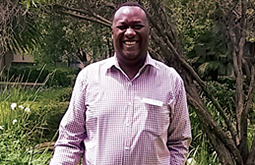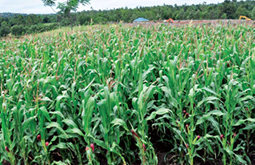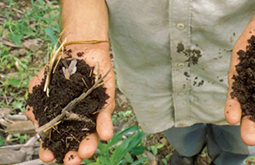Stanley Kuria Benard
Planning well in advance is key to achieving a zero-hunger worldPlanning well in advance is key to achieving a zero-hunger world
 What is your personal back ground?
What is your personal back ground?
Benard Kuria Stanley is a graduate of Nairobi university. After graduation, he joined the agriculture sector and has been working in the agrochemical industry for 20 years., of which 16 is in the cereals sector.
Why did you choose to be an agronomist?
I used to admire the way the Delmonte farm was being managed on the roadside way back in my high school days. I made up my mind that I would like to work and run such a farm way baxk when I was in form two.
How long have you been working with Cereal growers?
I have worked with cereal growers actively for the last sixteen years and I enjoy every bit of it.
Briefly discuss the challenges you go through daily? What would you point out as your strongest attribute that has made you succeed?
Cereal farming is the food basket of the country and majority of the growers are smallscale with minimum technical knowhow. This requires alot of input technically. Servicing all the cereal growers across the board is not easy. Each one needs some time and the day is limited to some 8-10 hrs…Any advice especially to smallscale growers is almost unquestionable. This means I have to take a lot of my time to understand their requirements and give the best advice.
 FAO and the African Union launched a new framework document that aims to increase agricultural efficiency and reduce drudgery by helping countries in Africa to develop strategies for sustainable farm mechanization.
FAO and the African Union launched a new framework document that aims to increase agricultural efficiency and reduce drudgery by helping countries in Africa to develop strategies for sustainable farm mechanization. Kenyan farmers produce enormous wealth for the country yet are largely poor. They must reject the farming model that keeps them perpetually poor, indebted, frustrated into alcoholism, domestic violence and seek trade justice. Crops grown on African farms are sold in retail outlets in Europe and the Middle East, while the aroma of coffee, tea and cocoa grown in her fields fills the air in most coffee and confectionery shops, outside of which the scent of flowers grown with her water fills the sidewalks.
Kenyan farmers produce enormous wealth for the country yet are largely poor. They must reject the farming model that keeps them perpetually poor, indebted, frustrated into alcoholism, domestic violence and seek trade justice. Crops grown on African farms are sold in retail outlets in Europe and the Middle East, while the aroma of coffee, tea and cocoa grown in her fields fills the air in most coffee and confectionery shops, outside of which the scent of flowers grown with her water fills the sidewalks. Narok is one among the big grain baskets in Kenya. Wheat, maize and barley are among the major cash crops grown in the area. Production of the above mentioned crops is in medium to large scale and rainfed. However, over the years, yield realized in tonnes per hectare (t/ha or bags/ ha) varies with famers despite replication of similar practices. As per the farmers growing wheat and barley in the area, yield vary from one farmer to another which means existence of an imperative scenario. Some people have suggested that this may be attributed to different crop husbandry and soil fertility management practices. Most commonly mentioned factors include: land tenure system, type of seed, soil correction where applicable and proper use of fertilizer in terms of composition, rates of application and timing. In trying to understand factors causing dwindling/varying yields, farmers and other interested parties have employed tools to precisely identify the major contributing factors. Soil testing is the is key to accurate and precise use of fertilizer. The tool seeks to reveal soil chemical, biological and physical characteristics from which useful information is deduced and the best management practices (BMPs) are recommended.
Narok is one among the big grain baskets in Kenya. Wheat, maize and barley are among the major cash crops grown in the area. Production of the above mentioned crops is in medium to large scale and rainfed. However, over the years, yield realized in tonnes per hectare (t/ha or bags/ ha) varies with famers despite replication of similar practices. As per the farmers growing wheat and barley in the area, yield vary from one farmer to another which means existence of an imperative scenario. Some people have suggested that this may be attributed to different crop husbandry and soil fertility management practices. Most commonly mentioned factors include: land tenure system, type of seed, soil correction where applicable and proper use of fertilizer in terms of composition, rates of application and timing. In trying to understand factors causing dwindling/varying yields, farmers and other interested parties have employed tools to precisely identify the major contributing factors. Soil testing is the is key to accurate and precise use of fertilizer. The tool seeks to reveal soil chemical, biological and physical characteristics from which useful information is deduced and the best management practices (BMPs) are recommended.